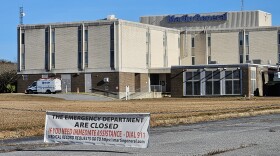United Healthcare and WakeMed Hospitals did not reach an agreement on a new contract by the June 1 deadline, meaning the Raleigh-based hospital is now out-of-network with the national insurer.
There are about 20,000 WakeMed patients with UHC insurance, though most patients currently in the hospital would still be covered under continuity of care policies that protect consumers in these kinds of situations. In addition, the No Surprises Act, which went into effect at the beginning of this year, offers some protections as well, however, in both of these situations, patients may have to fill out additional paperwork.
The WakeMed Physicians Network and ambulatory surgery centers are on a different contract and remain in-network, while specialists, hospitals, and outpatient clinics went out-of-network effective June 1.
This could present possible confusion, particularly for elective procedures. Patients could be billed in-network rates from the physician, but out-of-network rates from the facility.
The biggest disagreement point between the insurer and provider is over how many claims have been denied. With the employer-based health insurance model common throughout the U.S., health care economics functions differently than other marketplaces.
Patients with insurance pay monthly premiums, and then the insurer pays the bulk of the costs when patients seek out care. In theory, the insurer provides oversight to providers in order to keep health care costs in check, and reimburses for procedures deemed "medically necessary." But how the insurer and provider define medically necessary can differ, leading to the insurer denying claims that the hospital argues should be paid.
Those disagreements happen more with UHC than with other health insurance providers, according to Dr. Seth Brody, WakeMed's Chief Physician Executive.
"I have personally witnessed terribly sick patients being denied insurance coverage by UnitedHealthcare while already receiving care in our intensive care units," Brody said. "Our clinicians are doing their jobs at the bedside. UnitedHealthcare is simply looking to increase profits by complicating claims approvals and denying many claims after our patients have already received necessary medical care."
UHC says something different. According to the insurer, denied claims are due to double billing and other administrative errors by WakeMed. Furthermore, the insurer says WakeMed won't even come to the negotiating table to discuss new rate proposals.
"Based on WakeMed's actions over the past several months, we can only assume it was always the health system's intent to disrupt access to care for North Carolinians," UHC said in a statement released Wednesday morning.
In response, Brody acknowledged there were some billing mistakes.
"When you're submitting thousands and thousands of claims, you're going to have some errors," he said.
But Brody said WakeMed works hard to correct mistakes, and employs the same process to fix billing errors that it does with every other insurance payer, yet UHC denies claims "five to 10 times higher" than other insurers.
As for negotiating rates, Brody said it's far more important that the insurer pay for medically-necessary care. Once that is resolved, then WakeMed can discuss new rates, not before.
Both sides are saying they are motivated to reach a deal. If they find common ground within a few days, it likely wouldn't cause much disruption to patients, but if negotiations drag on for weeks or even months, it could lead to people seeking care from providers outside of the WakeMed network. Or employers seeking out a new insurance contract with a different health insurance provider.
UnitedHealthcare is a major player in the North Carolina health insurance market with more than $5 billion in direct accident and health premiums written.
That's a market share of nearly 20% in the state, second only to Blue Cross and Blue Shield of North Carolina which holds a 35% market share with more than $9 billion in direct premiums written, according to data from the N.C. Department of Insurance.







